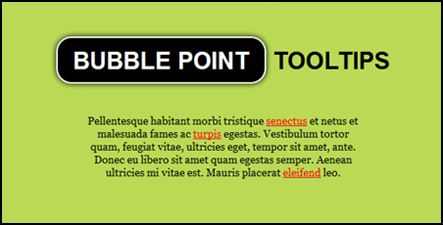Creating a Bubble Point Tooltips with CSS3 and jQuery
Chris Coyier shares a tutorial that creates a bubble point tooltips with CSS3 and jQuery. Note that its demo will not work on Opera.
To start with, here’s the HTML:
<a href="#" title="Hi, I'm a tooltip thingy.">link</a>
Givje the link a title attribute.
jQuery:
$("article a[title]").tooltips();
The plugin will do the following: loop through each link; make div.tooltip for each, text inside that matches it links the title attribute; remove links title attribute; when link is hovered on, it positions the tooltip accordingly and slides it to be visible; when link is hovered off, it slides the link out of visibility.
Here’s the massive code dump:
// IIFE to ensure safe use of $
(function( $ ) {
// Create plugin
$.fn.tooltips = function(el) {
var $tooltip,
$body = $('body'),
$el;
// Ensure chaining works
return this.each(function(i, el) {
$el = $(el).attr("data-tooltip", i);
// Make DIV and append to page
var $tooltip = $('<div data-tooltip="' + i + '">' + $el.attr('title') + '<div></div></div>').appendTo("body");
// Position right away, so first appearance is smooth
var linkPosition = $el.position();
$tooltip.css({
top: linkPosition.top - $tooltip.outerHeight() - 13,
left: linkPosition.left - ($tooltip.width()/2)
});
$el
// Get rid of yellow box popup
.removeAttr("title")
// Mouseenter
.hover(function() {
$el = $(this);
$tooltip = $('div[data-tooltip=' + $el.data('tooltip') + ']');
// Reposition tooltip, in case of page movement e.g. screen resize
var linkPosition = $el.position();
$tooltip.css({
top: linkPosition.top - $tooltip.outerHeight() - 13,
left: linkPosition.left - ($tooltip.width()/2)
});
// Adding class handles animation through CSS
$tooltip.addClass("active");
// Mouseleave
}, function() {
$el = $(this);
// Temporary class for same-direction fadeout
$tooltip = $('div[data-tooltip=' + $el.data('tooltip') + ']').addClass("out");
// Remove all classes
setTimeout(function() {
$tooltip.removeClass("active").removeClass("out");
}, 300);
});
});
}
})(jQuery);
CSS
.tooltip, .arrow:after {
background: black;
border: 2px solid white;
}
.tooltip {
pointer-events: none;
opacity: 0;
display: inline-block;
position: absolute;
padding: 10px 20px;
color: white;
border-radius: 20px;
margin-top: 20px;
text-align: center;
font: bold 14px "Helvetica Neue", Sans-Serif;
font-stretch: condensed;
text-decoration: none;
text-transform: uppercase;
box-shadow: 0 0 7px black;
}
.arrow {
width: 70px;
height: 16px;
overflow: hidden;
position: absolute;
left: 50%;
margin-left: -35px;
bottom: -16px;
}
.arrow:after {
content: "";
position: absolute;
left: 20px;
top: -20px;
width: 25px;
height: 25px;
-webkit-box-shadow: 6px 5px 9px -9px black,
5px 6px 9px -9px black;
-moz-box-shadow: 6px 5px 9px -9px black,
5px 6px 9px -9px black;
box-shadow: 6px 5px 9px -9px black,
5px 6px 9px -9px black;
-webkit-transform: rotate(45deg);
-moz-transform: rotate(45deg);
-ms-transform: rotate(45deg);
-o-transform: rotate(45deg);
}
.tooltip.active {
opacity: 1;
margin-top: 5px;
-webkit-transition: all 0.2s ease;
-moz-transition: all 0.2s ease;
-ms-transition: all 0.2s ease;
-o-transition: all 0.2s ease;
}
.tooltip.out {
opacity: 0;
margin-top: -20px;
}
Check out full tutorial by clicking on the image.







